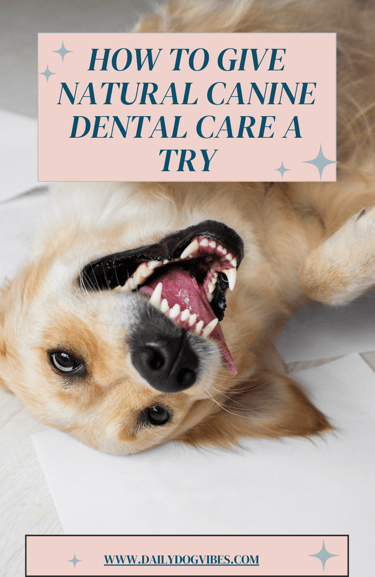How to Give Natural Canine Dental Care a Try
Taking care of your dog’s teeth can be costly, so prioritize preventative health. This guide for natural canine dental care will give your pet and your wallet positive vibes
SAFETY & WELLNESS


Natural Canine Dental Care
Taking care of your dog’s teeth can be costly and painful, so prioritize preventative health. This guide for natural canine dental care will give your pet and your wallet positive vibes.
Keep reading for preventative tips to keep your pup’s pearly whites gleaming.
A Brief Overview of Canine Dental Health
According to the American Veterinary Medical Association, dental care includes oral cleaning, fillings, extractions (teeth pulled), or repairs. Canine dentistry should only be performed by a veterinarian or board-certified veterinary dentist.
However, there are preventative approaches that are easy to implement when you dog is a puppy.
Prevent dental decay early on, so you can protect your dog and reduce unwanted dental bills. In addition to anesthesia free dental cleanings, keep reading for things you can do at home to protect your pup’s teeth.
Unfortunately, gum disease is common in dogs, affecting up to 80% of canines. Holistic canine dental care includes looking at the whole animal, and identifying problems that may impact dental health.
According to holisticpetinfo.com, this can include nutritional or enzyme imbalances. A holistic veterinarian will encourage preventative supplements and natural ways to reduce tartar for your dogs.
The Canine Dental Landscape: Understanding the Basics
Anatomy of Your Dog’s Mouth
Dogs have a lot of teeth, up to 42 adult teeth! In contrast, humans only have 32 adult teeth. But like humans, puppies lose all 28 “baby” teeth as they grow. Canine teeth include incisors, cuspids, premolars, and molars, which can lead to crowding.
This crowding decreases space between teeth and results in food getting stuck where bacteria can lead to decay. This is why daily preventative care is essential. Unfortunately, some dog breeds are more prone to dental problems than others, due to their small jaws.
Breeds with the Most Dental Issues
Across websites, these 5 breeds come up most often as having the worst dental issues:
Toy Poodles
Cavalier King Charles Spaniels
Chihuahuas
Yorkshire Terriers
Dachshunds
All of these dogs are breeds with small jaws. Flat faced dogs such as Pekinese and Pugs are also at risk for dental problems, although our shih tzu has great teeth so preventative care does make a difference!
In one study, most dogs with dental disease weigh less than 15 kg. Interestingly, mixed-breeds are less prone to inherited dental problems than purebred dogs.
How Oral Health Impacts Overall Wellness
Why is this important? Of course we want our dogs to have good breath and prevent pain. Signs of dental discomfort include bad breath, constant licking, eating less, and pawing at their mouth.
Another reason to have your dog say “aaaah” is the connection to the rest of their body. Dental decay can lead to damage of the heart, liver, and kidneys. This is called systemic disease, and it can result in a heart murmur, abdominal tenderness, weight loss, and death.
Natural Canine Dental Care 101
Brushing up on teeth brushing techniques
Brushing your dog’s teeth regularly is the number one way to reduce dental decay and vet bills. Our current dog, Roro, is really uncomfortable when anyone touches his mouth.
So make sure to get your puppy comfortable early on with the routine of brushing teeth. Brush your dog’s teeth daily. Daily Paws lists the following tips for brushing your dog’s teeth.
Days 1-3: Start slow. Let your dog sniff a toothbrush (without toothpaste).
Days 4-7: Add dog safe toothpaste and let your dog lick the toothbrush as a treat without brushing.
Days 8-10: Start brushing the front teeth gently. Add a few teeth each day. Although this may feel slow, it will keep your dog comfortable as brushing becomes part of their daily routine. Use a circular motion to brush around their tooth and gum line.
Choosing the Right Doggy Toothbrush and Toothpaste
Do NOT use human toothpaste for your dog! Since canines have a different pH balance in their mouth and should not consume fluoride, human toothpaste could make your pup sick.
Human toothpaste can also contain xylitol, which is toxic to dogs.
On the other hand, dog toothpaste is safe to consume and often flavored to make tooth brushing a positive treat. You can also try oral gel, such as peanut butter flavored gel.
Vets recommend using a finger covering that is silicone and disposable. These have texture to brush your pup’s teeth without being too invasive. However, if you do choose a toothbrush, pick an ADA-approved soft-bristle brush.
DIY Toothpaste Recipes for Natural Canine Dental Care
Betterpet.com offers 4 easy, DIY toothpaste recipes that will save you money and offer a safe, fluoride-free option for your pooch. There, you can find recipes for: “Super Simple DIY Coconut Toothpaste,” “Minty Fresh Dog Toothpaste with Olive Oil,” and “Healthy Boost Kelp and Turmeric Doggie Toothpaste Blend.”
However, we don’t recommend their “Bouillon-seasoned” toothpaste recipe because bouillon cubes and meat broths can be very high in salt, which is dangerous for dogs.
Chew-sing Wisely: Dental Chew Options
Dental chews with enzymes can greatly decrease tarter buildup.
Give you dog a dental chew each night while holding it so your dog has to really gnaw. If your dog gulps it down without much chewing, it defeats the purpose.
The Power of a Nutrient-Rich Diet
To prevent systemic disease, always keep the big picture in mind. Preventative wellness takes the whole animal into account, starting with a nutritious diet.
Herbal Supplements for Natural Canine Dental Care
While brushing and a healthy diet are important for dental care, don’t forget about your dog’s gums. Gently brush in a circular motion along their gums to increase circulation and remove food.
Sage, turmeric, thyme or cinnamon can be mixed with coconut oil to reduce inflammation. Coconut oil has anti-bacterial and anti-fungal properties, which is great for dental health.
But be sure to use tiny amounts because too much oil can upset your pup’s stomach if swallowed.
Dental Toys for Dogs
Since dental hygiene is crucial for a dog’s overall health, choosing the right toys can play a significant role in promoting dental care. Dental toys are designed to address oral hygiene by providing a fun and functionality, but are also safe to chew.
These toys often feature textured surfaces or special materials that help remove plaque, promoting salivation. Some dental toys are meat flavored to keep your dog interested, ensuring a more thorough cleaning of their teeth.
Investing in quality dental toys for your dog not only helps keep their teeth clean but also provides mental stimulation and a healthy outlet for their natural chewing instincts.
Interactive Toys for Natural Canine Dental Care
Interactive toys for dental stimulation take dental care to the next level by engaging dogs both mentally and physically. These toys are designed to encourage active play, combining the benefits of regular exercise with the promotion of dental health.
Many interactive dental toys are shaped to allow dogs to manipulate them, promoting jaw and neck muscles’ strength while simultaneously cleaning their teeth. Some toys incorporate treat-dispensing features, adding an extra layer of excitement and motivation for dogs to work on their oral health.
The interactive nature of these toys not only contributes to cleaner teeth but also helps prevent boredom, anxiety, and destructive behavior by keeping dogs mentally engaged and physically active.
We fill Kong toys with greek yogurt or peanut butter and freeze it for our dog. Or to save time, you can try a pupsicle starter pack, with a silicone tray, interactive toy, and premade treats to freeze.
Additionally, freezing dog-friendly (no salt) broth or water in rubber toys creates a refreshing treat when dogs are teething or on a hot, summer day. The right toys serve as effective dental tools and strengthen your bond with your dog with play.
Encourage a Lifelong Commitment to Dental Health
Your dog is a family member. Hopefully they will live with you for many years to come. However, as a loving and responsible pet owner, caring for your dog’s teeth is a no brainer.
Although I don’t recommend assigning canine dental care to children, who may be nipped by a nervous dog, they should watch you to learn these strategies.
These easy strategies, when started early, can prevent pain for your dog and wallet for years to come!


